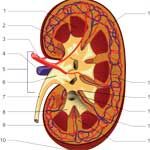
Thursday, March 13 is World Kidney Day – a day for raising awareness of the importance of keeping our kidneys healthy.
What do kidneys do?
The kidneys are two small, bean-shaped organs, each about the size of a fist, located near the middle of your back, just under the ribcage. Their job is to act as a filter, to make sure the right amount of waste products and fluid are removed from your body. They also keep things like salt and acids balanced, and produce hormones that your body needs to function properly. Every day, adult kidneys filter 200 litres of blood!
What is kidney disease?
Chronic kidney disease (CKD) is a potentially lethal condition that is having a serious impact on the Aboriginal and Torres Strait Islander community. CKD is when your kidneys slowly lose their ability to function – it’s known as a “silent disease” because it often goes unnoticed until it’s too late.
But CKD can be detected early on, through routine blood, urine and blood pressure checks. If a problem is detected, CKD can be slowed down or even stopped by medicine and lifestyle changes.
How do I keep my kidneys healthy?
- Cut down on the grog – drinking too much can lead to heart disease and high blood pressure, increasing the risk of kidney disease.
- Quit smoking – people who smoke are three times more likely to have reduced kidney function
- Maintain a healthy weight – people who are overweight are at an increased risk of developing diabetes and high blood pressure, major risk factors for kidney disease.
- Eat well – a nutritious diet can help your body stay healthy, and can help to prevent diseases.
- Drink more water – you should have six to eight glasses a day.
- Exercise – exercise can help you maintain or lose weight, as well as reducing your risk of developing heart disease and diabetes, risk factors for kidney disease.
If you’re worried about your kidney health, ask your doctor or Aboriginal health worker for a kidney performance test. For more information, call the Kidney Health info line on 1800 682 531 or head to www.kidney.org.au





Comments are closed.